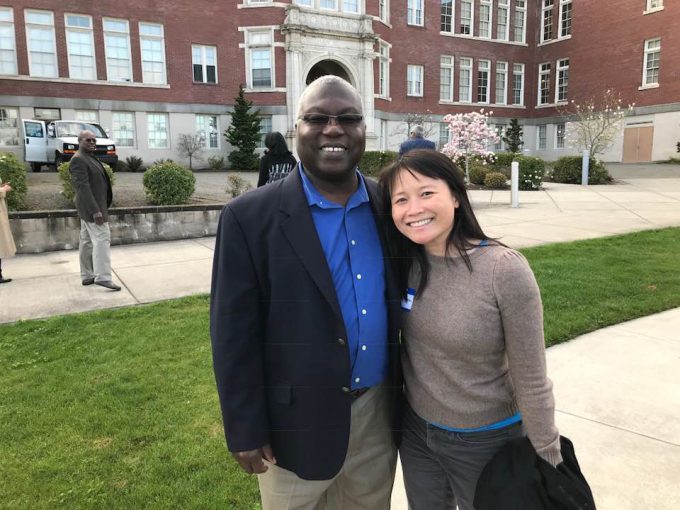THE WAYS AND WHYS OF SAYING GOODBYE
by Julie Pham
Society places great emphasis on making a good initial impression and how we say “hello” for the first time. Interestingly, our last impression, or how we say “goodbye,” is often undervalued. I’d argue the closing of a relationship matters even more than the beginning.
A “hello” signifies the start of a relationship and all the possibility that brings. The first interaction comes before any delight, disappointment, sympathy, frustration, love, hate, and most importantly, connection, can actually set in.
By the time we say “goodbye,” the history and connection have already been established. A “hello” is always with someone. A “goodbye” can be with someone, but it can also be done to someone.
I usually focus on a question used in a trust-building exercise for Ion Collaborators, Washington Technology Industry Association’s civic collaboration program. In this month’s “Beyond Small Talk,” I’m going to focus on a question that emerged numerous times throughout our pilot of the Ion Collaborators program: How do you say goodbye when ending a relationship?
When I tell people about the Ion Collaborators program, they always ask me how I get people to commit so much time to collaborating with strangers when they don’t even know what they’re going to work on when they start the program? I set clear expectations, but it’s still a challenge.
Of the 18 original Collaborators in our last Ion cohort, we had four people drop out over the course of five months. Three could no longer commit the time and one moved out-of-state for a new job. Through watching the remaining team members move on with the project, I learned a lot about the act of saying (or not saying) goodbye.
In this column, I will be talking about platonic relationships, professional and nonprofessional. The “end” could be triggered by leaving a job, a team, or a project. Parts of my reflection can also shed light on how to say goodbye in romantic and familial relationships.
Why is saying goodbye so hard
Ending a relationship is usually hard. Often because the person saying goodbye is afraid of hurting or disappointing those left behind. So, our goodbyes can drag and dribble on without clarity. I’ve definitely had my share of passive aggressive goodbyes. I’m still sheepish about throwing away an unopened letter from someone who I passively ended a friendship with because I was afraid of a confrontation. The anticipation of causing harm is so great that the goodbye sometimes never happens.
A proper goodbye requires a response from the person or people who are left behind when the relationship ends. It has to be done in-person with both parties fully engaged. Email, voicemail, and letters without in-person follow-up are cop-outs. Saying goodbye requires a bit (or a lot) of emotional effort.
Avoiding a goodbye altogether is now so prevalent that we have a term for the non-goodbye: it’s called ghosting. Dictionary.com describes “ghosting” as “the practice of suddenly ending all contact with a person without explanation, especially in a romantic relationship.” According to Urban Dictionary, ghosting is “to avoid someone until they get the picture and stop contacting you.”
The Urban Dictionary definition reinforces the notion that avoiding a goodbye is acceptable. It even implies that the person being “ghosted” is the one with the problem and needs to move on. What does that say about our inability to accept responsibility for saying goodbye?
Technology aggravates ghosting. I’ve often been left wondering why I haven’t heard back from someone: “I’ve sent multiple emails, maybe they got trapped by the Spam filter?,” or “I tried messaging them through Facebook, maybe they’re not on Facebook that often?,” or “I tried leaving a voicemail too, maybe they haven’t checked it yet?”
Have you ever heard a friend or colleague complain about wanting to get off of a team or out of a project, but can’t seem to do it because they are “too busy”? Have you been that person? I know I have. I have used up valuable emotional energy by dragging out goodbyes because I was avoiding the confrontation. I’ve learned the hard way that goodbyes done well are also done quickly.
What happens to those left behind without a goodbye
Whenever someone ended any kind of relationship with me without giving me a chance to respond in real-time, I was left with questions. In the absence of their explanations, I imagined the reasons.
In Ion, the team collaboration is very important. As a requirement to join the program, Ion Collaborators understand that if they have to drop for any reason, they must serve on the team until they find their own replacement. They are also asked to inform their team members in-person or over the phone if they need to drop from the program.
Three out of the four Collaborators who left the program gave their team members an opportunity to say goodbye and to express their gratitude for their participation up until that point.
There was only one team that didn’t get the benefit of an in-person goodbye, despite my repeated requests of the departing team member to do so. After the person sent out a short “can’t participate anymore because I’m too busy-thanks y’all” email, I facilitated a meeting and asked the remaining team members to share how they felt by this member’s sudden departure.
What surprised me was the range of feedback, from “We don’t have their side of the story. We have to continue,” “I feel disrespected and disappointment because I thought we were all in this together”, “There were times I’ve wanted to drop out, but I made a commitment” to “I’m trying to learn from this, why someone would leave like this.”
In this case, the goodbye was done to the team, not with the team.
What does it take to say goodbye
Saying goodbye is an invitation for others to react to your departure. It requires the person ending the relationship to fully engage with the reaction. A goodbye done well is with others, not to others.
When the first Ion Collaborator informed me that she needed to leave the team, I said, “Your team needs to hear this from you, not me.” She was surprised when I asked her to tell the team before she found a replacement. I felt they should know as soon as possible. So, she told them. And they expressed their understanding and their gratitude.
Goodbyes don’t have to be said by only those who initiated the end of the relationship. A few years ago, I received notice that my role at a company was going to be eliminated because of budget cuts. I asked to be the one who announced the news to the entire staff a full two weeks before my last date. I had watched other employees who were laid off depart without a word and left us whispering in speculation of what happened. I wanted to be the one who told the story of my departure. I turned what could have been awkward into an opportunity for others to say goodbye.
I have not always been proactive about insisting on a proper goodbye. I regret not following up with some colleagues after they were let go and their departure was announced by a robotic email message. They deserved a note of appreciation from me.
Reader, how have you ended relationships in your past? Are you proud of how you said goodbye? Or do you wish you had done it differently?
A non-goodbye can turn the end of the relationship to the end of all possible future relationships. The inverse is true too.
Last week, I got to witness a joyous goodbye. It was the retirement party for Seattle Times columnist Jerry Large after a 37-year-career writing a twice-weekly column about our local community. The guests got to pay tribute to his contributions and his long career.
Perhaps we should think of goodbyes as mini-retirement parties? Jerry wasn’t saying goodbye forever, just goodbye to his career as a columnist with the Seattle Times. He left the possibility open for other kinds of relationships to develop in the future. The last line in his final column read, “Bye for now and best wishes.”
Goodbyes done well mean “goodbye for now” with the possibility of a renewed “hello” in the future.
Special note: We’re about to start recruiting for cohort 3 of the WTIA Ion Collaborators, which will start in June. We are especially in need of government employees. If you work for the government, check out details here.
Julie Pham, PhD runs _ion, a program of the Washington Technology Industry Association (WTIA) that recruits and leads volunteers from tech, government and community-based organizations to tackle our civic challenges. She grew up in Seattle, after immigrating to the United States as a refugee from Vietnam. She co-owns Northwest Vietnamese Newswith her family. She loves throwing dinner parties in her International District home.



